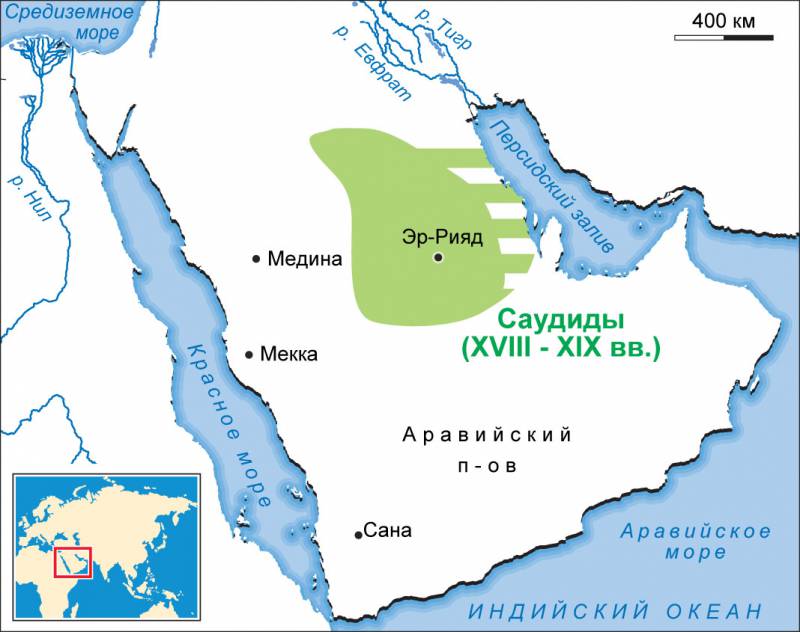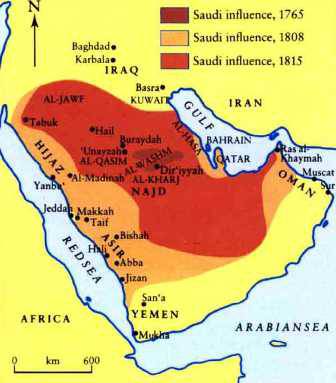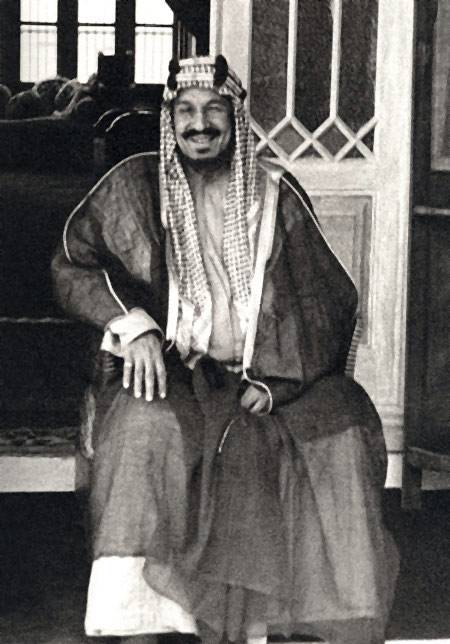Country Saud. How Saudi Arabia turned into a Middle Eastern power

In fact, story Saudi state (Saudis) began much earlier - in the first half of the XVIII century. At that time there was no single state in Central Arabia, and various Bedouin tribes fought for dominance in the oases. The disunity of the Bedouins did not allow them to unite efforts to repel the periodic raids of the Meccan sheriffs, who besieged the Central Arab tribes and oases with tribute. Even more dangerous for Arabia was the powerful Ottoman Empire, which formally declared the peninsula to be its possession. Just as a protest against the Ottoman expansion in the Arab lands, in the middle of the XVIII century, the Wahhabi movement began to form. It was named after Muhammad ibn Abd al-Wahhab (1703-1792), a Muslim theologian from Uyayna (Nejd), who advocated a return to true Islam and strict adherence to the rules and regulations prescribed for Muslims. Naturally, first of all, the Ottomans, who were not distinguished by austerity and temperance, fell under the definition of “wrong”. In 1744, Ibn Wahhab settled in the small town of Ed-Dirya, where he found support from the local ruler of the emir Mohammed ibn Saud (1710-1765) - the representative of the Anaza tribe. The preacher and the emir perfectly complement each other. Ibn-Wahhab gained numerous supporters and fighting power, and Ibn-Saud - an ideology that allowed him to unite the previously disparate Nejd tribes and come to the fore among the other emirs and sheikhs of Central Arabia.

This is how the Diyri Emirate or the First Saudi State emerged, which by the middle of the 1760s. subjugated the whole of Central Arabia, capturing the most important cities of the region - Uyaynu, Ayayanu, Riyadh. By the end of the XVIII century. The diyrian emirate subjugated Eastern Arabia as well. The Ottoman troops sent to pacify the Wahhabis suffered a defeat and were forced to retreat, after which the Saudis launched a series of invasions into Iraq, where in 1802 the city of Karbala was defeated. In 1803, the Saudis took Mecca, and in 1805, Medina and almost all of the Hejaz. 1805 to 1810 The Saudis invaded Iraq and Syria, but in 1811 they encountered a powerful adversary, the Egyptian Wali (viceroy) Muhammad Ali. Egyptian troops in 1813 recaptured the Hijaz, and by 1817 they even occupied Nejd, the epicenter of the Saudi movement. In 1818, the capital of the emirate of Ed-Dirya fell. Emir Abdullah ibn Saud was taken to Istanbul, where he was executed by beheading.
The first Saudi state actually ceased to exist. But three years later, in 1821, a new anti-Ottoman uprising led by Turki ibn Abdallah broke out in Riyadh. In 1824, the Second Saudi State was created. It existed until the beginning of the 1890-ies, when on the Arabian Peninsula the positions of Saudi rivals, the clan al-Rashidi, which destroyed the Second Saudi State, were seriously strengthened. Having lost in the struggle for power, the Saudis were forced to flee to Kuwait. The actual control over Nejd was gained by the members of the clan ar-Rashidi, who ruled in the emirate of Jebel Shammar.
For nine years, the Saudis were in exile in Kuwait, where they accumulated strength for revenge. By this time, they had a new strong and strong-willed leader - the young Abdul-Aziz al-Saud, also called Ibn-Saud (1880-1953). In 1902, 22-year-old Abdul-Aziz al-Saud invaded Nejd, where he was able to quickly capture Riyadh. But the Rashidi family did not intend to give up their positions without a fight - she requested help from the Ottoman Empire, which was not interested in the return of the Saudis. Istanbul sent an expeditionary force to Nejd, but it was defeated and was forced to leave Central Arabia.
Like his ancestor Muhammad ibn-Saud, Abdul-Aziz relied on a combination of military-political actions with the approval of "pure Islam". In 1912, they founded the Ikhvan Brotherhood, which all Bedouin Nejd tribes were urged to join. From Ikhvanov, Abdul-Aziz demanded the creation of agricultural colonies - “hijr”, complete submission to the emir - the imam, and the total rejection of any contacts with non-believers and Muslims living in European colonies. The inhabitants of the Ikhvan settlements were at the same time both farmers and warriors, since in case of a declaration of war they were mobilized into military units. Already in 1915, the fraternity consisted of at least 60 000 people.
 By 1912, the whole of Central Arabia was ruled by Abdulaziz. Emirate Nejd, who ruled Abdulaziz, enlisted the support of the British Empire. The British saw the Saudis as a natural counterweight to the influence of the Ottoman Empire in the region, and since Germany was gaining strength behind the Ottoman Empire, it was extremely important for London to prevent the Ottomans from returning to the Arabian Peninsula. It was the British authorities who ultimately provided the main support to the Arabs who fought against the Ottoman Empire in the early twentieth century. At the time of the collapse of the Ottoman Empire, five independent states were formed on the peninsula: Hejaz, Nejd, Jebel Shammar, Asher and Yemen. In 1921, the troops of Abd al-Aziz al-Saud inflicted a crushing defeat on the Rashidi detachments and captured the emirate of Jebel Shammar. After that, the emir of Nejd proclaimed himself the Sultan, and the emirate of Nejd was transformed into a sultanate with the same name.
By 1912, the whole of Central Arabia was ruled by Abdulaziz. Emirate Nejd, who ruled Abdulaziz, enlisted the support of the British Empire. The British saw the Saudis as a natural counterweight to the influence of the Ottoman Empire in the region, and since Germany was gaining strength behind the Ottoman Empire, it was extremely important for London to prevent the Ottomans from returning to the Arabian Peninsula. It was the British authorities who ultimately provided the main support to the Arabs who fought against the Ottoman Empire in the early twentieth century. At the time of the collapse of the Ottoman Empire, five independent states were formed on the peninsula: Hejaz, Nejd, Jebel Shammar, Asher and Yemen. In 1921, the troops of Abd al-Aziz al-Saud inflicted a crushing defeat on the Rashidi detachments and captured the emirate of Jebel Shammar. After that, the emir of Nejd proclaimed himself the Sultan, and the emirate of Nejd was transformed into a sultanate with the same name. The main rival of the Saudis on the Arabian Peninsula after the defeat of Rashidi was the influential Hashimite dynasty, which ruled in Hejaz. King Hijaz Hussein ibn Ali was distinguished by expansionist and hegemonic aspirations - being the ruler of Hijaz, on whose territory were sacred Muslims Mecca and Medina, and taking advantage of the fall of the Ottoman Empire, Hussein ibn Ali in March 1924 declared himself a new caliph of the faithful (previously, this tatrite of the faithful (previously, this tatel of the faithful) tradition belonged to the Sultan of the Ottoman Empire). But the plans of Great Britain, which, after the collapse of the Ottoman Empire, claimed the leading role in Middle Eastern politics, did not include the unification of Arab Muslims under the rule of Hussein ibn Ali. In London, to a greater degree, they favored the Saudis, who were regarded as a profitable ally, who had no serious expansionist plans. As a result, using the support of Great Britain, the Sultanate of Nejd attacked the Hejaz. The short war ended with the defeat of Hejaz.
After the defeat of the Hashimites in 1925, the Kingdom of Nejd and Hejaz was created, which the Soviet Union was one of the first to recognize in 1926. The Soviet leaders would know in that distant time that they recognize the state, which for many decades will become one of the most important ideological opponents and geostrategic obstacles to the expansion of Soviet influence in the Middle East. Moreover, the adversary is tough and has developed political, financial, economic and military ties with the UK and the USA. 20 May 1927, the United Kingdom also recognized the Kingdom of Nejd and Hejaz.
Meanwhile, King Abdulaziz did not stop at conquering the Hijaz. On the Arabian Peninsula, there were still a few practically independent possessions, which he intended to subordinate to his power - Al-Hasa, Al Qatif and Asher. Al-Hasa is located in the northeastern part of the Arabian Peninsula, near Qatar. Al Qatif is also located in eastern Arabia - on the shores of the Persian Gulf, and most of the population in it are still Shiites. Finally, Asher was the most imposing of these possessions.
The emirate of Asher in 1906 founded Muhammad ibn Ali al-Idrisi. Formally, Asher’s territory was then part of the Yemen ’vilayah of the Ottoman Empire, but was in fact controlled by local tribal leaders. In 1909, al-Idrisi raised a powerful rebellion against the Ottomans, forcing the Ottoman leadership to 1910 to recognize Muhammad ibn Ali as ruler of Asher. 3 August 1917, Muhammad proclaimed himself the emir of the independent emirate Asher, after which he was recognized by Great Britain. However, after Muhammad ibn Ali passed away in 1923, the struggle for power began between his relatives. In 1926, the son of the late Emir Ali was overthrown by his uncle Hassan. Civil strife seriously weakened the already very loose emirate. In April, a part of the emirate 1925 was captured by the Imam of neighboring Yemen, after which 21 October 1926, the emir al-Hassan signed an agreement on the protectorate of the Kingdom of Nejd and Hejaz over the emirate of Asir. In accordance with the text of the treaty, Asher recognized the primacy of the Kingdom of Nejd and Hejaz in foreign policy matters. However, soon Emir al-Hassan decided to restore his authority over Asir in full, for which he turned for help to Yemen. Meanwhile, the 23 of September of 1932, the Kingdom of Nejd and Hejaz, was renamed the Kingdom of Saudi Arabia, which emphasized the Saudis' claims for power in the entire Arabian Peninsula. In 1934, KSA was annexed by Asher, annexed by Saudi troops.
Thus, by the beginning of the 1930's. under the rule of Abdul-Aziz was a huge territory - almost the entire Arabian Peninsula, with the exception of Yemen, Oman and a group of emirates of the Persian Gulf. But, at the same time, the Saudis have established very complex and contradictory relations with the leaders of other Arab states. Saudi Arabia was in a kind of isolation caused by the old grievances of the monarchs of Iraq and Jordan - they came from the Hashemite dynasty, which the Saudis ousted from the Hejaz. Permanent territorial disputes have contributed to maintaining tensions with Yemen.
However, the growth of the influence of Saudi Arabia in the Arab East, and then wider - in the Muslim world, contributed to the discovery of oil fields. In 1933, American oil companies began exploring oil fields in Saudi Arabia, after which it became clear that the country's lands hide enormous oil reserves. The King of Saudi Arabia transferred the basic rights for the development of oil fields to the American company ARAMCO. Income from oil exports, however, came directly to the royal family of the Saudis. With the growth of profits from oil exports, the Saudi Arabia’s budget began to grow seriously. By the beginning of the 1950's. Saudi Arabia has become the richest state in the Middle East, and the Saudi royal family has taken a strong position among the richest families in the world.
Solid financial capabilities have significantly changed the role and place of Saudi Arabia in international politics. First of all, the country became the largest sponsor of religious Islamic organizations operating in all parts of the world, and also began to provide financial assistance to many Muslim countries in Asia and Africa, including quite odious regimes like Idi Amin Dada in Uganda or Mohammed Siad Barre in Somalia. At the same time, throughout the Cold War between the USSR and the socialist bloc on the one hand, the United States and its allies on the other, Saudi Arabia remained the most important geopolitical partner of the United States in the Arab world.
In the twentieth century, two main ideologies fought for ideological influence in the Arab world — secular Arab nationalism with a “leftist” socialist tinge (to it Egypt during the reign of Nasser, Syria, Iraq, Libya and a number of other states) and religious fundamentalist traditionalism, supported by Saudi Arabia and, to a lesser extent, the Gulf Emirates. The United States and Great Britain, fearing the spread of Soviet influence in the Middle East through the establishment of secular Arab nationalist regimes, betrayed Saudi Arabia and religious fundamentalists. The rigid traditionalist regime in Saudi Arabia allowed the country to maintain a political system in which there was no place for modern political parties, left ideology, secular culture.
Strong ties between Saudi Arabia and the West persisted after the collapse of the Soviet Union. Saudi Arabia played a key role in eliminating the last secular nationalist regimes of the Arab world in Iraq, Yemen, Libya, Egypt, but in Syria it faced serious resistance from supporters of Bashar al-Assad, supported by Russia. Nevertheless, despite the fact that, in fact, Russia and Saudi Arabia are on opposite sides of the barricades in the Middle East, Saudi leaders are quite frequent guests in Moscow, since without the participation of Saudi Arabia, it is difficult to imagine a modern Middle Eastern policy.
At the same time, many unresolved political problems have accumulated in Saudi Arabia itself, which will inevitably manifest themselves, and in a sufficiently foreseeable future. We are talking about ethno-confessional problems - 15% of the country's population are Shiites, whose relations with the authorities of the kingdom are very tense, about the migration situation - a large number of migrants from Africa and South Asia live in Saudi Arabia, which also creates additional social risks. Finally, there is a socio-political discontent with the policies of the ruling dynasty and among the country's Arab population.
Information